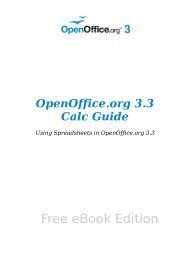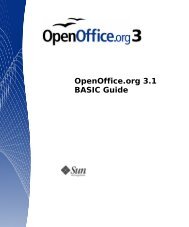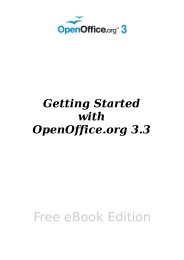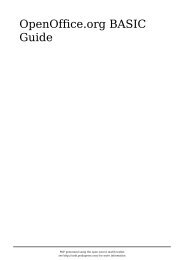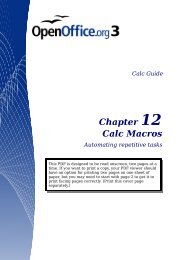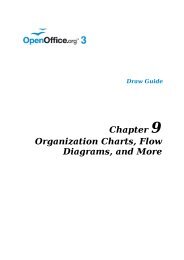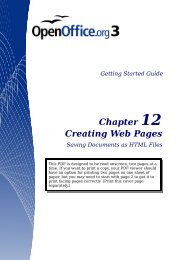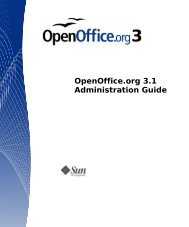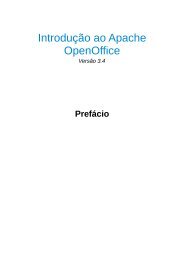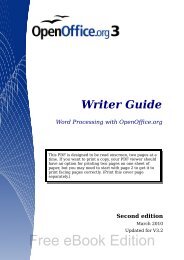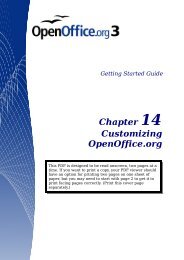OpenOffice.org BASIC Guide - OpenOffice.org wiki
OpenOffice.org BASIC Guide - OpenOffice.org wiki
OpenOffice.org BASIC Guide - OpenOffice.org wiki
You also want an ePaper? Increase the reach of your titles
YUMPU automatically turns print PDFs into web optimized ePapers that Google loves.
Numbers<br />
with long integer variables are very fast and are particularly useful for loop counters. If you assign a floating point<br />
number to a long integer variable, the number is rounded up or down to the next whole number.<br />
Example declarations for long integer variables:<br />
Dim Variable as Long<br />
Dim Variable&<br />
Single Variables<br />
Single variables can store any positive or negative floating point number between 3.402823 x 10 38 and 1.401298 x<br />
10 -45 . A single variable can take up to four bytes of memory. The type declaration symbol for a single variable is !.<br />
Originally, single variables were used to reduce the computing time required for the more precise double variables.<br />
However, these speed considerations no longer apply, reducing the need for single variables.<br />
Example declarations for single variables:<br />
Dim Variable as Single<br />
Dim Variable!<br />
Double Variables<br />
Double variables can store any positive or negative floating point numbers between 1.79769313486232 x 10 308<br />
and 4.94065645841247 x 10 -324 . A double variable can take up to eight bytes of memory. Double variables are<br />
suitable for precise calculations. The type declaration symbol is #.<br />
Example declarations of double variables:<br />
Dim Variable As Double<br />
Dim Variable#<br />
Currency Variables<br />
Currency variables differ from the other variable types by the way they handle values. The decimal point is fixed<br />
and is followed by four decimal places. The variable can contain up to 15 numbers before the decimal point. A<br />
currency variable can store any value between -922337203685477.5808 and +922337203685477.5807 and takes<br />
up to eight bytes of memory. The type declaration symbol for a currency variable is @.<br />
Currency variables are mostly intended for business calculations that yield unforeseeable rounding errors due to<br />
the use of floating point numbers.<br />
Example declarations of currency variables:<br />
Dim Variable As Currency<br />
Dim Variable@<br />
Warning – The handling of Basic Currency type is not reliable. Issue 31001 Issue 54049 Issue 91121 Issue<br />
107277 are still not corrected on <strong>OpenOffice</strong>.<strong>org</strong> version 3.1.1.<br />
Floats<br />
The types single, double and currency are often collectively referred to as floats, or floating-point number types.<br />
They can contain numerical values with decimal fractions of various length, hence the name: The decimal point<br />
seems to be able to 'float' through the number.<br />
You can declare variables of the type float. The actual variable type (single, long, currency) is determined the<br />
moment a value is assigned to the variable:<br />
14 <strong>OpenOffice</strong>.<strong>org</strong> 3.2 <strong>BASIC</strong> <strong>Guide</strong> · March 2010



